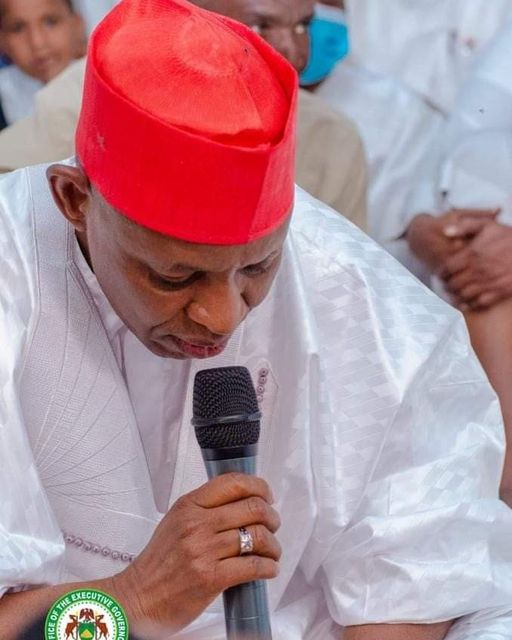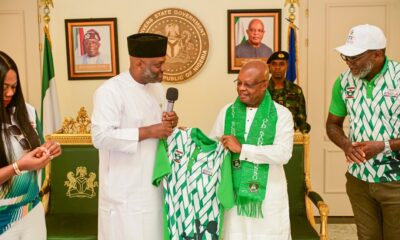Politics
INEC And Imo Governorship Case
Nduka Madu
It is now approximately thirty months since the good people of lmo State gave Chief Martin Agbaso, the gubernatorial candidate of the All Progressives Grand Alliance (APGA) an overwhelming mandate to govern them for four years. Thirty months after, the question on the lips of the preponderant majority of lmo men and women today is how much longer will they have to wait for justice to be done to them?
When the Court of Appeal sitting at Abuja decided, on the 26th of February, 2007, that it has jurisdiction to hear Chief Agbaso’s appeal, the people of lmo State heaved a big sigh of relief in the belief that at last the matter was coming to a head. This was especially so as the court was undeterred by the spirited attempts made by the legal representation of both INEC and Chief Ohakim to use technicalities to once again scuttle Chief Agbaso’s bid to be heard. The court held with remarkable resoluteness, that the twin issue of whether INEC had power under the law to cancel the April 14 Elections in the circumstances and in the manner in which it did, had not been pronounced upon or even addressed by any court. Both INEC and Chief Ohakim’s legal teams speedily headed for the Supreme Court to continue their challenge of the Court of Appeal’s jurisdiction to hear Chief Agbaso’s appeal.
Chief Agbaso’s lead counsel, arguing that the Agbaso case was time bound, tried desperately but without success, to persuade the Court of Appeal to allow the parties to adopt their briefs which had all been filed by then, so that whenever the Supreme Court ruled on the Appeal Court’s jurisdiction, a date for judgment on the substantive suit would be fixed and so expedite the process. The court’s position was that it was established law that once a matter had gone before the Supreme Court, proceedings on the matter in all subsidiary courts must cease pending the Supreme Court’s decision or direction on it.
In the spirit of the urgency demanded by the Agbaso suit, the Supreme Court quickly fixed the hearing of the case in the hope that an accelerated hearing would be given to the matter. But on the day of hearing, the INEC and Chief Ohakim’s camps came with new motions which they deliberately neglected to file so that they could get time elongation to file them which they indeed got. Chief Agbaso’s lead counsel wasted no time in alerting the court that the game plan of the opposition was to delay and prolong proceedings for as long as possible so as to prolong the illegal stay of Chief Ohakim in office. The presiding justice promptly gave the assurance that the court would take adequate steps to ensure that proceedings were not unnecessarily delayed. It was therefore surprising to the Agbaso camp when the court fixed a four and half month adjournment. When Chief Agbaso’s lead counsel protested, the presiding judge promptly assured him that the September 29 date which the court had fixed for the next hearing of the case was in fact the earliest possible date the matter could be heard.
This was because the court would be proceeding on its annual recess in July. Besides, it had at least four pending judgements to write and deliver before the court went on vacation.
Four and half months have now sped past and September 29, 2009 is now around the corner. The question now is: will the Ohakim and lNEC camps be prepared to proceed or will they conjure up new devices for obtaining more elongation of the proceedings? The fact of the matter is that they know that they cannot successfully challenge the facts of Chief Agbaso’s case. As a member of their legal team confided, there is no doubt that lNEC had no legal grounds on which to base its decision to annul the April 14 Imo State Governorship elections. So, their game plan from the beginning has been and still continues to be, to use all the legal technicalities they can muster to delay the hearing of the substantial case. Their hope is that they will succeed in stalling the conclusion of the case well beyond the three years Chief Ngige remained illegally in office in Anambra State to enable Chief Ohakim serve, if not the full four years, at least long beyond the three years Ngige served. The question is, will they succeed?
It will be a travesty of justice of unimaginable proportions were that to happen. To begin with, the Court of Appeal had ruled on February 26, 2009 that the April 28 election, on the basis of which Chief Ohakim assumed and remains in office, ought not to have been held ab initio. What this means is that the election that ostensibly brought him to power is invalid. That being so, his tenure is invalid and so he should be made to vacate the office of Governor of Imo State without further delay. The issue has even been compounded and made much worse for Chief Ohakim by his defection from the Progressive Peoples Alliance, PPA, on the platform of which he contested the invalid April 28th election. So, not only quote the April 28 election by which he rules declared invalid, he has also lost the platform on which he could stand to argue his case to be allowed to remain in office. Indeed, a case can now be made for striking out Chief Ohakim’s appeal on the ground that he has lost his locus on the basis of which he was entitled to enter the appeal. However, any such move will only serve to prolong the current proceedings and play into the hands of those who wish the proceedings could continue till 2011.
Now that the long awaited September 29,2009 had arrived, nothing should – be done which should have the effect of further prolonging the determination of the key question which Chief Agbaso has been asking to be answered these past thirty months; which is, “Did lNEC have power under the law to cancel the Imo State Governorship elections validly held on April 14, 2007, the results of which had been fully collated in all the twenty-seven LGAs of the state and duly announced in at least twenty-four of the twenty-seven L.G.A. Collation Centres of the state”. If the answer to that question is no, then the results already collated should be assembled and a winner for that election declared.
Madu wrote in from Owerri
Politics
Kano Gov Approves N15.6bn To Settle Ex-APC Councillors’ Entitlements

Governor Abba Yusuf of Kano State has approved the release of N15.6 billion for the payment of outstanding severance gratuities, accommodation, and leave allowances owed to over N3,000 former councillors across the State’s 44 local government areas.
The approved payment covers councillors who served during the periods of 2014–2017, 2018–2020, and 2021–2024 under the administration of former Governor Abdullahi Ganduje. The entitlements, which remained unpaid for years, will now be disbursed in three installments between April and June 2025.
In a statement issued by the Special Adviser on Information to the Governor, Ibrahim Adam, the administration described the move as a corrective measure to address the neglect of past leadership and fulfil a promise to ensure fairness to public office holders.
“The approval of N15.6 billion is in fulfilment of Governor Abba K. Yusuf’s commitment to ensuring that all outstanding entitlements owed to our dedicated public servants are fully paid. It is a matter of principle and justice to uphold the dignity of those who have served in elected positions”, Mr Adam said.
He noted that the financial intervention reflects the governor’s broader vision of governance rooted in fairness, accountability, and public trust.
“His Excellency recognises the sacrifices and dedication of these former councillors. This action is part of a larger effort to right the wrongs of the past and restore faith in public administration,” he added.
Local government officials and affected former councillors have welcomed the decision, describing it as long overdue and a step toward healing the financial frustrations of many grassroots leaders.
Governor Yusuf’s administration, elected on a different political platform than his predecessor, continues to draw commendation for its proactive efforts to resolve inherited liabilities and improve the welfare of public servants.
As the payment schedule begins, it is expected that this intervention will offer financial relief to thousands and stimulate local economic activity across the state.
Politics
Gunmen Disrupt Political Rally In Bayelsa ….As Turnah, Others Emerge New Associates’Leaders
Scores of spectators and political faithful were hospitalised after a yet to be identified gunmen invaded a rally organised by a group loyal to the Minister of the Federal Capital Territory (FCT), Chief Nyesom Wike and President Bola Tinubu in Yenagoa, the Bayelsa State capital.
Part of the activities scheduled to hold at the occasion was the inauguration ceremony of the Bayelsa State chapter of the ‘New Associates’, a pro-Wike political forum.
The Tide which monitored the event reports that trouble started just at the preparatory stages of the event, when the unidentified gunmen launched sporadic gunshots from a farm close to the venue of the event, injuring unsuspecting spectators and party faithful across party lines.
However, calm was restored after a swift intervention by men and officers of the Nigeria Police Force and other security formations which enabled the event to go on as planned.
Speaking to newsmen shortly after restoration of calm, factional South-South zonal Secretary of the Peoples Democratic Party (PDP) and Chairman, Caretaker Committee of the State’s chapter of the party, Barrister George Turnah, commended security operatives for their timely response.
He noted that the plan of detractors had been defeated as forces loyal to certain individuals in the State never wanted the rally to hold as scheduled.
Turnah, who doubles as Convener of the ‘New Associates’ in the State, commended President Tinubu and Chief Wike for the appointment and facilitating the same for Ijaws across the Niger Delta region.
He said, but for the love of the duo for the Ijaw people of various extractions, the Presidency would not have given preferential political portfolios in the Federal Government’s Ministries Departments and Agencies (MDAs) to Ijaws even though the ethnic nationality produces bulk of the natural resources for the economic mainstay of the nation.
The PDP chieftain reiterated that the reason for the event which was attended across party lines was to say ‘thank you’ to the two political leaders, stressing that to ‘whom much is given, much was expected’.
“For me, I’m of the larger opposition party, PDP. But I’ve decided to support and work for President Tinubu for what he is doing for the Ijaw nation, Niger Delta region in particular and Nigeria in general.
“President Tinubu has given Bayelsans and other Ijaws across the Niger Delta region several juicy political appointments. He appointed our brother and son, Heineken Lokpobiri as Minister of Petroleum even though former President Muhammadu Buhari had previously appointed a Bayelsan as Petroleum Minister in his government.
“Apart from the Petroleum Minister, Tinubu has also appointed Ijaw sons, Chief Boma Iyaye as Executive- Director, Finance, and Dr Samuel Ogbuku as Managing-Director and CEO of the Niger Delta Development Commission.
“Though former President Buhari had appointed Ogbuku initially in Acting capacity, when President Tinubu came, even after sacking all board members of the Commission, he still kept our brother, the MD and upon the completion of his tenure in Acting capacity, the President again reappointed him as substantive MD/CEO.
“But there’s one man who has made all these appointments for Ijaws possible. He is the FCT Minister, Nyesom Wike. Ijaw people, Bayelsans are we not enjoying these appointments?
“Has the NDDC not lit up the entire Niger Delta region? Are you not feeling the impact of the Ogbuku-led NDDC? So for me and all the members of the New Associates we’ve decided to support President Tinubu for a second tenure so that our state and region can benefit more from his government”, he said.
“We want Governor Douye Diri to tell us his stand on the forthcoming 2027 general election. He should tell us whether he is supporting the President or not. If he’s supporting the President, we’ll work with him. After all, Diri was the first Governor from the South-South zone that benefitted from the President’s magnanimity during the 2023 elections and even in terms of infrastructure projects and appointments of Bayelsans at the Federal level”, Barr Turnah added.
In his remarks, Chairman of the occasion, and leader, Rivers Ijaw Peoples Congress (RIPCO), Senator George Sekibo, lauded President Tinubu and the FCT Minister for their love and friendship with the Ijaw people.
Represented by former Chairman of Akuku-Toru Local Government Area of Rivers State, Dr Roland Sekibo, Senator Sekibo said the ‘New Associates’ political forum was to galvanize support for the President for his 2027 election.
He said while President Tinubu had performed well as Nigeria’s leader, the FCT Minister had continued to show leadership from the federal level after showing the same in Rivers State while serving as governor.
“I like to thank the convener of the ‘New Associates’ political forum in Bayelsa State, Barr. George Turnah (MON) and the Coordinators for standing firm in spite of threats from highly placed political leaders not to hold this event.
“Love is not theoretically, but must be expressed, which explains why they have gathered to celebrate their Excellencies, President Tinubu and Barr. Ezewon Nyesom Wike for the various roles they have played and have continued to play to ensure the appointment of Ijaw sons and daughters to positions of trust and authority at the federal level.
“The ‘New Associates’ is in synergy with President Tinubu and will continue to follow directives from the FCT Minister who has openly declared support for Mr. President”, he said.
Ariwera Ibibo-Howells, Yenagoa
Politics
Enugu LP Loses Pub Sec To PDP
The Publicity Secretary of the Labour Party (LP) in Enugu State, Mr Titus Odo, has defected to the Peoples Democratic Party (PDP).
Mr Odo defected to the PDP on Wednesday alongside the former Commissioner for Chieftancy Affairs in the State, Emeka Mamah, who was the state Coordinator of the Peter Obi Presidential Campaign in the 2023 presidential election.
The duo dumped the PDP during the 2023 general elections for the Labour Party.
Receiving the defectors at the party’s state secretariat, the state PDP Chairman, Martin Chukwunwike, expressed happiness over their decision to return to their former party.
He explained that Governor Peter Mbah gave them the directive to do everything possible to bring back aggrieved party members who left the party.
“We are happy to have them in our midst, and God has set this party on a good footing, as 2027 is already assured,” he said.
The PDP chairman, however, called for unity within the party to package themselves ahead of the 2027 elections.
Speaking during their presentation to the party state chairman, Mr Odo expressed joy for returning to his former party, revealing that Mr Mbah’s massive development in the State informed his decision.
“I am happy to tell you that I am back to my home. I came back because of the giant development strides of Governor Mbah and I say kudos to him.
“The second reason is the defection of my immediate boss, the LP governorship candidate for the 2023 election in Enugu State, Dr Chijioke Edeoga.
“Another reason is that the council chairman in Igboeze North, Mr Uchenna Ogara, is turning the council area into a township,” he said.
Mr Mamah also thanked the PDP leadership in Igboeze North, Enugu North Senatorial zone and the state chapter of the party for receiving him back to the party.
He extolled Mr Mbah for extending hands of fellowship to those who had left the party, saying, “Personally, I am pleased with the performances of our governor.”
-
Politics2 days ago
2027: Diri Threatens To Sack Appointees Who Jump INEC’s Whistle
-

 Niger Delta1 day ago
Niger Delta1 day agoRivers Begins, Supplemental Polio Vaccination, Morrow
-
Rivers2 days ago
Ibas Preaches Peace In Emohua
-

 Nation2 days ago
Nation2 days agoTinubu To Unveil Cotton Factory In Ogun – Abiodun
-
Business2 days ago
NEPC Distributes 4,633 Hybrid Seedlings Across Nigeria
-
News2 days ago
Tinubu Vows To Prioritise Workers’ Welfare
-
Politics2 days ago
Election Rigging: Nigerians React As Appeal Court Upholds Prof Ogban’s Conviction
-

 Featured1 day ago
Featured1 day agoRSG Commits To Workers’ Welfare …. Calls For Sustained Govt, Labour Partnership

